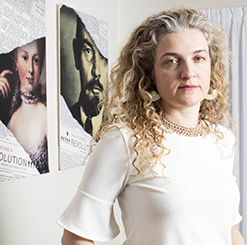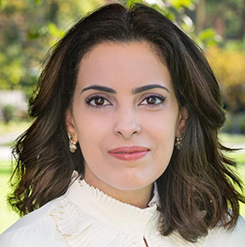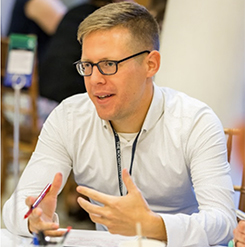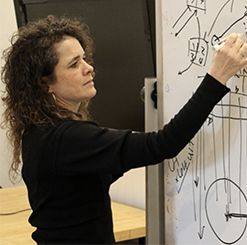Learning to study a painful past
Peter Dizikes, MIT News
First published here.
If you ask MIT associate professor Lerna Ekmekçioğlu how she wound up in academia, she has a straightforward answer.
“I was born a historian,” Ekmekçioğlu says. “It was my destiny.”

Lerna Ekmekçioğlu is the McMillan-Stewart Associate Professor of History at MIT, and an affiliate of the Women and Gender Studies Program and the Center for International Studies
That natural affinity for history has propelled her through the ranks of academia, as a pioneering scholar of Armenians in Turkey, including Armenian women. Her specialty is a complex topic involving a historical catastrophe: the role of women in society after the 1915 Armenian genocide.
More specifically, Ekmekçioğlu studies how Armenian women helped keep their community intact, even while transforming it by introducing feminist ideas. Her best-known book, “Recovering Armenia: The Limits of Belonging in Post-Genocide Turkey,” published in 2016 by Stanford University Press, reconstructs the life of the community of survivors, including its feminist voices, in the first decades after World War I.
Ekmekçioğlu’s basic interest in this subject is not hard to account for. She grew up in Istanbul, Turkey, as part of the small Armenian community remaining there over the decades. In this sense, Ekmekçioğlu really was born to be an Armenian historian. Understanding the world she grew up in meant understanding its past.
“I always had a curiosity about Armenian history,” Ekmekçioğlu notes. Still, it is a big leap from personal curiosity to a sustained career. And, as she recounts it, “I did not have any role models, really,” in academia, because there was so little work about what she wanted to study.
For this reason, Ekmekçioğlu’s career has two layers. One is her research and teaching—for which Ekmekçioğlu was awarded tenure at MIT last year.
The other is the extensive effort she has made to disseminate Armenian history to other students. Ekmekçioğlu is currently working on multiple projects at MIT to make Armenian historical materials widely available, and thus to create conditions in which today’s students and future researchers and historians can readily study the subject.
“I almost feel it as a responsibility,” Ekmekçioğlu says. “I see this as a public service.”
To see why this matters to Ekmekçioğlu, consider the circumstances in which she first started studying Armenian history and Armenian feminism, as an undergraduate at Bogazici University in Istanbul. The basic problem Ekmekçioğlu encountered: There weren’t established courses about Armenians, let alone Armenian women, at the university. Teaching Armenian history, to this day, remains a punishable crime in Turkey.
So Ekmekçioğlu and a few other students founded reading groups to study Armenian history and share information about written sources and materials that pertained to Armenian women. Together, a few of them entered a research paper competition, for all fields of history‚ and finished third.
That was enough to help Ekmekçioğlu and her friends gain more support from professors, who encouraged them to keep pursuing the subject. And they have: One of Ekmekçioğlu’s undergraduate friends was Melissa Bilal, now a faculty member at the American University of Armenia, in Yerevan, Armenia, with whom Ekmekçioğlu still collaborates on research and pedagogical projects.
As an undergraduate, Ekmekçioğlu also spent a year abroad at the University of Athens before graduating from Bogazici University in 2002. She then attended New York University as a graduate student, receiving her MA in 2004 and her PhD in 2010. After a year as a postdoc at the University of Michigan, Ekmekçioğlu joined the MIT faculty in 2011. Today she is the McMillan-Stewart Associate Professor of History at the Institute, and is affiliated with MIT’s Women’s and Gender Studies program and the Center for International Studies.
Ekmekçioğlu’s work examines a psychological and social strain at the heart of the lives of many Armenian women. After a shocking, traumatic human catastrophe, they were simultaneously trying to push their society forward, by developing new norms and rights for women, while also trying to hold their fractured community together by maintaining the cultural traditions of the past.
“By definition, they had to change,” Ekmekçioğlu says. “But that goal is in tension with maintaining Armenian tradition.”
In her book, Ekmekçioğlu’s work cleverly draws on written sources, such as an overlooked Armenian magazine called Hay Gin, to draw out the thoughts of the women she studies. More broadly, she has collaborated with Bilal to both publish and analyze an array of original-source documents about Armenian women, ranging in time from the 1860s to the 1960s.
When Ekmekçioğlu was still in graduate school, she and Bilal co-edited the first such volume on the subject, published in Istanbul in 2006 and translated as, “A Cry for Justice: Five Armenian Feminist Writers from the Ottoman Empire to the Turkish Republic.” Today, she and Bilal are working on a more comprehensive volume for publication, to be published in English as well as the original languages, with the working project title, “Feminism in Armenian: An Interpretive Anthology and Digital Archive.”
One component of this will be a volume combining original primary-source writings and scholarly essays, meant to make the ideas of Armenians a more easily accessible part of mainstream women’s history, and intended for classroom use.
Moreover, as the title suggests, Ekmekçioğlu and Bilal are working on a digital component of the project, which is intended to be the most comprehensive set of source materials on the subject yet in existence. She credits MIT as one of the institutions that has made this kind of project possible; she also recently received a Mellon Faculty Grant of the Center for Art, Science, and Technology, for a related public exhibition on the subject.
“There is a lot of curation involved in this,” Ekmekçioğlu says. “I’ve had a lot of support at MIT.”
While Ekmekçioğlu is a leading historian of the early Turkish Republic in general, most of her work has come with the clear purpose of calling attention to overlooked women who, in exceedingly difficult times, sought to keep their society alive.
“It’s only fair to those women who worked so hard, to do that,” Ekmekçioğlu says.
Saudi scholar and activist Hala Aldosari joins CIS as the Robert E Wilhelm Fellow
First published here

Hala Aldosari, a Saudi scholar and activist, is the Center's 2019-20 Robert E Wilhelm Fellow
Hala Aldosari, a Saudi scholar and activist in women’s rights in Arab societies, violence against women, and the “guardianship” system in Saudi Arabia, joins the MIT Center for International Studies (CIS) as its Robert E Wilhelm Fellow.
Aldosari arrives to MIT on June 1, 2019, and will spend the academic year conducting research on successful initiatives of women's rights in the Arab countries. In addition, she will use the fellowship to establish an advocacy organization to advance women’s and human rights in Saudi Arabia.
Aldosari maintains a women’s rights advocacy project online (www.aminah.org) and participates in advocacy efforts and community capacity building aimed at promoting women’s rights and combating violence against women in Saudi Arabia. She is an advisory board member for Human Rights Watch in the Middle East and the Gulf Center for Human Rights. She is also serving as a steering committee member in the Harvard-lead initiative, Every Woman, to establish a United Nations global treaty on violence against women.
She has worked as a medical scientist, lecturer, and an administrator in the Saudi health and education sector. She has also worked as a consultant to the Ministry of Health in Saudi Arabia in research and planning of the country’s national health policy and services.
A writer and a blogger, Aldosari comments on Saudi political and social affairs. Her writings have been featured in several major media outlets including Foreign Affairs, The New York Times, The Guardian, and Foreign Policy, among others.
In February, she was selected as the inaugural recipient of The Washington Post’s Jamal Khashoggi Fellowship. The fellowship—a new global opinions program established to honor the late Post columnist Jamal Khashoggi—provides an independent platform for journalists and writers to offer their perspectives from parts of the world where freedom of expression is threatened or suppressed.
“When surveying the turbulence in the Middle East, the Center’s concerns include the dissolution of order and optimism in Arab states, the crisis in the Gulf generally, and the quashing of human rights values and aspirations 6-8 years after Arab Spring. We need to understand the region more clearly, and our students should be exposed to first-hand knowledge of pressing issues. Dr. Aldosari is a recognized pioneer on many of these issues and will contribute greatly to our intellectual community. We look forward to welcoming her to MIT,” said Richard Samuels, Ford International Professor of Political Science and the director of CIS.
Aldosari comes to CIS from New York University where she served as a scholar in residence at the Center for Human Rights and Global Justice. Prior to that, she was a visiting scholar at The Radcliffe Institute for Advanced Study, Harvard University (2017-2018), and at The Arab Gulf States Institute in Washington, DC (2016-2017). In 2015, she completed a fellowship at Johns Hopkins University, focusing on social determinants of women’s health and violence against women.
She earned her PhD in health services research from Old Dominion University, concentrating on the epidemiology of violence against women and its adverse health outcomes in Saudi Arabia. She earned her MSc in medical science from the University of Surrey, United Kingdom.
“It is an honor to receive the fellowship at such a pivotal and transformative moment in the Arab countries. I am grateful that it will provide me with a precious opportunity to organize my thinking and research for political and civil reforms in Saudi Arabia,” said Aldosari.
MIT Policy Lab launches EdX course on policy outreach
Dan Pomeroy, PL@CIS
First published here
The MIT Policy Lab at the Center for International Studies (PL@CIS) recently launched a new EdX course entitled “Tools for Academic Engagement in Public Policy.” This short course provides a clear, concise, high quality resource for scientists and engineers who are seeking to inform the development of public policy with their research. By providing a basic overview of how governing bodies work, how policy is made, and specific strategies for impacting this process the PL@CIS hopes to significantly reduce the amount of time it takes for researchers to begin engaging with policymakers and increase their effectiveness at policy outreach.

Dan Pomeroy is the managing director and senior policy advisor of MIT's Policy Lab at the Center for International Studies (PL@CIS)
The content of the course is informed by over four years of PL@CIS (formerly the International Policy Lab) experience working with MIT faculty to develop strategies for engaging with policymakers. The PL@CIS was created to ensure that public policies are informed by the best available research and that scholars understand the potential policy impact of their own work. This online tool seeks to take the lessons learned by the PL@CIS and make them available to the broader research community.
“MIT generates a lot of research with important implications for public policy that unfortunately doesn't always find its way into policy circles,” said Faculty Director Chappell Lawson, Associate Professor of Political Science. “Many faculty members here want to have an impact on policy but don't feel familiar enough with how the process works to do so efficiently. Creating an online educational tool to help connect the academic and policy communities is another way MIT can fulfill its mission of helping to solve the world's great challenges.”
This short course will provide an essential introduction to the policymaking process through the lens of the U.S. federal government, while providing specific steps researchers can take to engage policy stakeholders and articulate the policy implications of their work. It also includes community discussion forums to receive peer feedback on engagement strategies and to contribute to the online community of scientists interested in informing public policy.
“Academic training rarely covers the importance of engaging with policymakers or provides the tools necessary to do so effectively,” said Dan Pomeroy, PL@CIS Managing Director and Senior Policy Advisor. “When I decided to transition to work in public policy after receiving a PhD in physics, I struggled to understand how to apply my skillset to this new field. The intent of this tool is to provide a resource for both people within academia wanting to engage with policymakers as well as scientists and engineers interested in pursuing a career in public policy.”
The mission of the PL@CIS is to develop and enhance connections between MIT research and public policy. The PL@CIS accomplishes this mission by helping faculty define realistic policy goals and develop effective outreach strategies based on these goals and the time the faculty member wishes to devote.
The PL@CIS then provides mentorship, staff assistance, and training to help faculty conduct outreach efficiently and effectively. In addition, the PL@CIS provides modest grants for MIT faculty members to translate their scholarship for policy audiences and to cover the costs of engaging with the policy stakeholders. All of these efforts are designed to maximize the impact of faculty members' policy engagements while minimizing the expenditure of faculty time.
This course was produced in partnership with Meghan Perdue, SHASS Digital Learning Fellow, and with the support of MIT’s Office of Open Learning. It was also sponsored in part by Harvard Medical School's Scientific Citizenship Initiative (SCI). SCI works to make science more socially responsive and responsible by empowering scientists to collaboratively engage with and lead in their communities and society.
3Q: Sarah Williams on mapping urban transport
Digitally mapping informal transportation networks in developing cities can help them reach the United Nations' Sustainable Development Goals
Michelle English, MIT Center for International Studies
First published here
Imagine that you’re a city planner who needs to make decisions about where to place public housing, amenities, or critical services, but you don’t have a complete picture of how people move throughout the city. You simply don’t have the data needed to make these decisions. That is the case for 92 percent of the world’s largest low- and middle-income cities faced with transportation data deficits. Add informal transit into the picture—matatus in Nairobi, colectivos in Mexico City, jeepneys in Manila—and the situation gets even more complex since these modes operate outside of formal public transportation and their routes and schedules tend to be irregular. Not every city has the means of creating or collecting data on informal transit to get that full picture of the network. Sarah Williams is combining her skills as a geographer, architect, data scientist, and city planner to address such deficiencies in developing cities. Her goal is to create data for civic change. Her latest project is an open-platform resource center for Latin American and Caribbean cities.

Sarah Williams is associate professor of technology and urban planning Photo: Laura Kerwin/CIS
Q: What is your new initiative and what do you hope to accomplish?
A: We’re creating an open platform for anyone who is interested in accessing tools for mapping urban informal transit in Latin American and Caribbean cities. Transportation data is essential for economic development, and the goal is to make creating and collecting transportation data easier.
Our resource center will link people to the right resources and tools to create transportation data that can influence policy outcomes. We’re linking city transit operators, local governments, nonprofit and civic organizations, startups, and researchers to open access data collection and analysis tools, tutorials, case studies, and a global knowledge network on policy, data, and mobility. Overall, the resource center’s efforts contribute to the United Nations Sustainable Development Goal 11 to “make cities inclusive, safe, resilient and sustainable” and to target 11.2, which calls for “safe, affordable, accessible, and sustainable transport systems for all.”
The MIT Civic Data Design Lab’s main partners for this project are the Inter-American Development Bank and Mastercard Center for Inclusive Growth, and it will be led by World Resources Institute Mexico, the MIT International Policy Lab, and Columbia University’s Earth Institute.
Q: What are the main challenges to collecting urban data in this region and how are you addressing those challenges?
A: When it comes to developing cities, one major challenge is that data is scarce. This is the case across many sectors but especially urban transportation. Another challenge is that governments, NGOs, transit operators, and other actors don’t know how to access funds to pay for data collection, and there is lack of knowledge about the tools that are available for accomplishing this. On top of everything, transportation networks in developing cities are rarely unified. There are hundreds of operators across public transit and informal transit that are not necessarily coordinated with each other in terms of who goes where and who serves whom. This presents challenges to urban planning, reaching sustainable development targets, and providing accessibility to public transit and amenities in cities.
To address these challenges, we coordinate the right stakeholders to be part of transit mapping initiatives, help connect them to funding sources, train people to develop transit data in a standardized format, show people who use transit data as an analysis tool, and connect people to the local tech community to build new products with the transit data.
Q. How did you become interested in urban transportation?
A: I wasn't always interested in transportation, but when I saw how severe congestion in Nairobi could bring the city to a standstill, I knew I needed to get involved and use my skills to address critical transportation problems. I quickly learned how the crippling problems I saw in Nairobi also afflict other developing cities.
The resource center that we’ve launched is largely inspired by the Civic Data Design Lab’s Digital Matatus project in Nairobi. Launched in 2012, Digital Matatus began as a collaboration between MIT, Columbia University, and the University of Nairobi. The project captured transportation data for Nairobi’s informal matatu network and resulted in the development of mobile routing applications and a new transit map for the city. The data, maps and apps are now free and available to the public, transforming the way residents of Nairobi navigate and think about their transportation system.



